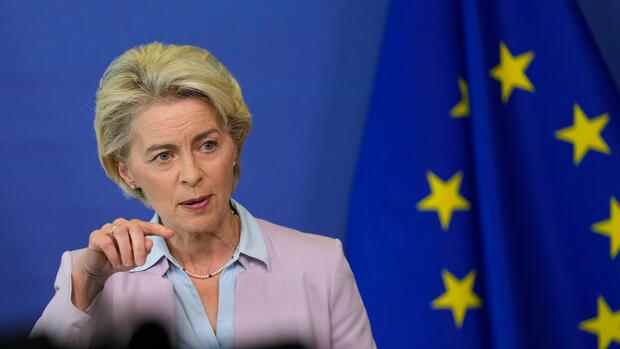Dusseldorf, Brussels On Friday, the EU Commission will propose to the energy ministers to limit the income of most electricity producers and skim off any profits. “Member States limit the income of producers (…) from the sale of electricity to a maximum of 200 euros per MWh of electricity,” says a draft law that is still incomplete and is available to the Handelsblatt.
The value of 200 euros is in square brackets in most places in the text. This means that the Commission has not yet finally decided on this value.
One megawatt hour (MWh) of electricity for delivery in the coming year is currently being traded at a good 500 euros on the Leipzig energy exchange EEX. In the meantime it was even 800 euros. The 200 euros clearly cover the price. In the summer of last year, the annual contract cost around 80 euros, at the beginning of 2021 just over 51 euros.
- wind
- Sun
- geothermal
- Hydropower except pumped storage power plants
- biomass
- waste incineration
- sewage treatment gas
- biogas
- nuclear power
- Brown coal
- oil
Hard coal should be included if the production costs of the corresponding power plants are below 200 euros per megawatt hour. Small power plants and test facilities in particular should be exempt.
Member States should support budgets
The manner in which member states limit revenues must be regulated in national laws. The Commission would like to leave it up to you whether the profit is already skimmed off during settlement on the stock exchange or afterwards.
However, the Commission wants to stipulate that the Member States pass on the income to needy end customers. Alternatively, the money can be used to promote renewable energies or a reduction in demand from companies.
This severely restricts the member states. “The proceeds may not be used to directly support specific consumers other than households,” the draft says.
Commission President Ursula von der Leyen said: “We want to divert these unexpected profits to help households and businesses that are particularly affected to adapt.” The same applies to “chance profits” from companies that do their business with fossil fuels.
Furthermore, the Commission probably wants to enable the Member States to intervene more in price setting on the electricity market. According to current law, states are permitted to cap the price of electricity for households. This should also be possible for small and medium-sized companies, at least for part of their electricity consumption. It is proposed that up to 80 percent of the companies’ electricity consumption will be reduced in price. This number is in square brackets, so it is subject to internal voting.
Von der Leyen promises help for energy suppliers
The proposals for skimming off profits are similar to the federal government’s plans. The EU states will now discuss this. “The goal is to influence the price of electricity, knowing full well that it is also influenced by global circumstances,” von der Leyen said.
At present, the price of electricity in Europe is mainly determined by expensive gas-fired power plants, which are switched on to produce electricity due to the high demand. Since the price of gas has risen sharply against the background of the war in Ukraine, electricity has also become more expensive.
Other energy companies that produce electricity more cheaply – for example from wind, solar or nuclear power – make big profits because they can also sell their electricity at the higher price. Some of these “chance profits” are to be skimmed off and used to relieve the burden on consumers.
But oil and gas companies also made big profits, von der Leyen said. “We will therefore propose a solidarity contribution for such companies. Because all energy sources must contribute to this crisis.” Member States should use these revenues to support particularly affected households and continue to invest in clean, domestic energy sources.
The producers of cheap energy benefit from the high price of electricity.
(Photo: dpa)
As a further measure against the high electricity prices, von der Leyen suggested reducing electricity consumption during times of high demand. “We will propose a binding target for reducing electricity consumption at peak times.” Electricity is particularly expensive during peak periods because expensive gas is used for production on the market during peak periods.
>> Read here: This is how EU officials plan to intervene in the electricity market
At the same time, one must support the energy supply companies, which are currently struggling with the enormous volatility of the markets, said von der Leyen. “We will update our state aid frameworks so that state guarantees can be provided swiftly in an emergency.”
Russian gas is missing in Europe
As a last measure, von der Leyen named a price cap for imports of Russian gas. “The goal here is very clear. We must reduce Russia’s revenues, which Putin is using to finance his cruel war against Ukraine,” the politician said.
>> Read here: “Limiting Putin’s income”: That is von der Leyen’s five-point plan for the gas crisis
Since Russia halted supplies via Nord Stream 1, very little Russian gas has flowed to Europe via Ukraine and Turkey. Von der Leyen said Russian gas now accounts for just 9 percent of EU gas imports, down from 40 percent at the start of the war.
EU energy ministers meet on Friday to discuss options. According to von der Leyen, the EU Commission could then present a corresponding legal proposal next Tuesday.
More: IMF calls on the EU to jointly borrow against the energy crisis
